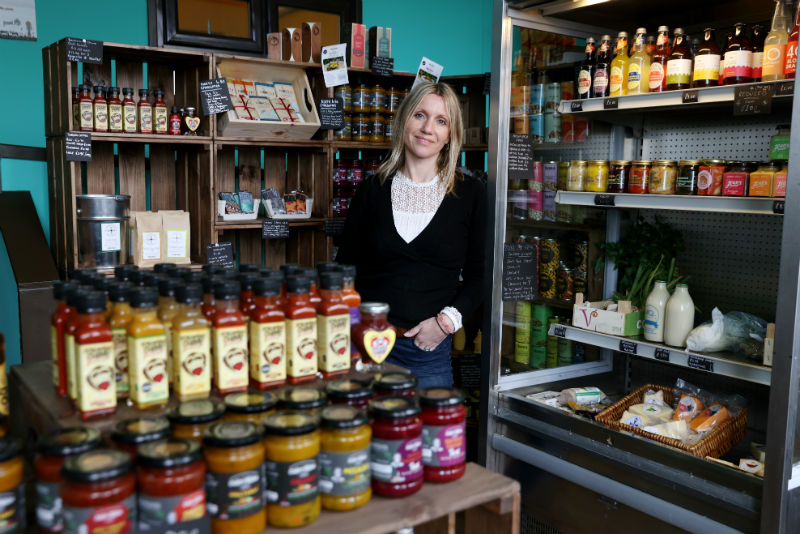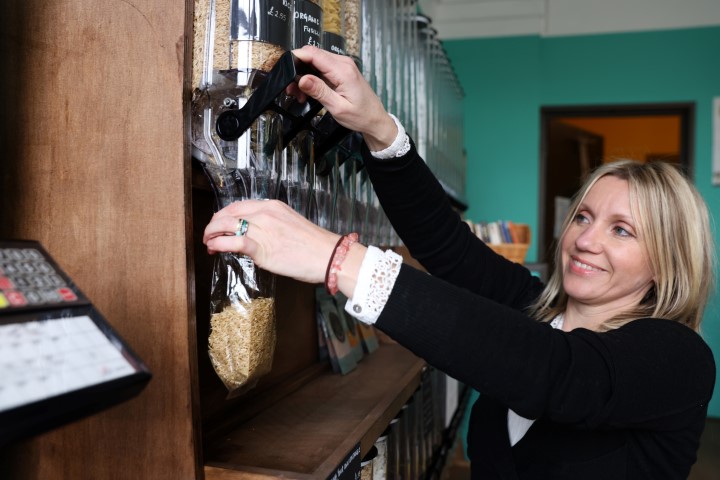
Sunderland-born Claire Wayman worked as a fashion designer in New York before returning to her home city with her husband and young children. In 2019, she and her husband, an independent filmmaker, founded Sunshine Co-operative, an online retailer of locally sourced, sustainable food delivered door-to-door. Sunshine Co-operative has now opened a grocery shop in High Street West in Sunderland which, in addition to stocking an array of locally sourced goods, is now working to help people from disadvantaged communities into work.
When asked what she has learned from her enterprise, Claire says: “I’ve learned so much, particularly about resilience. I’m really stubborn, which helps, and I believe you can learn to do anything as you go along. There are good people around, and I think if you give people half a chance, they can do amazing things.”
What inspires you? We believe everyone deserves the chance to eat fresh, eat healthily and eat local, because knowing where your food has come from is just as important as the taste. We want to nourish the area where we live both economically and environmentally, creating a thriving community using food and health as unifying elements.
What led to you setting up Sunshine Co-operative? There were many things at play. Firstly, I didn’t want our children to grow up in New York, and I wanted to get out of corporate life. We struggled to find work that matched our skills when we came here, so we started thinking of business ideas connected to things we were interested in. We were passionate about eating well and supporting local producers because of the impact of huge supermarket chains on small businesses like butchers, bakers, greengrocers, small farmers and traders. We also know that when people shop locally, money spent with local businesses stays in circulation within the local economy for longer. In fact, pound for pound, spending money in smaller independent local food outlets supports three times the number of jobs than a national grocery chain. We’d seen the benefits that the growing movement for supporting local producers has brought to communities in other parts of the world and we wanted to bring some of that sunshine here. That’s how Sunshine Co-Operative came about.
What drives you? I’m passionate, I’m committed, and I like to see kindness in the world. I’m really stubborn – I’ve had to be to make this work. I want to see people and businesses working together more because people working together are much stronger. I’ve done a lot of community work in the past and I want to channel my energy into giving Sunderland the support it needs.
What’s your purpose in running this enterprise? It’s our means of being catalysts for change. The co-operative has made a commitment to play its part in improving the local area environmentally, economically and through health and wellbeing. We believe everyone, whatever their background, has the right to live in abundance. We want to nourish a sense of community between local producers and consumers; increasing access to sustainable and organic food, raising awareness of food sustainability, stimulating community involvement in food production and growing, while demonstrating that food has an impact on our health, economy and environment.
You could have just set up a commercial food enterprise, couldn’t you? I could, but there’d be nothing behind that; it’d just be retail. I think that fundamentally, food is medicine, and one of our goals is to educate people about healthy eating, because we’re in an area where there are obesity and mental health issues. Also, as people, as a family, we don’t just want to survive, we want to thrive, so we’re always looking at different ways of bringing that attitude into the business.
When we set up the shop, I’d been doing some work with refugees, helping them to learn English, and I thought it would be great if we could help people assimilate and integrate by using the shop as a classroom or training space. We’re now setting the shop up as a training academy for anyone, not only refugees, who need that sort of help.
How will the shop and training academy work? We’ve got some funding from Community Led Local Development (CLLD) to employ two part-time staff to help get the shop to a point where we’re recruiting people for a simple training programme. It’s for people who need help because they have gaps on their CV, or have no CV, or no working experience to speak of, and we can support them in a positive working environment. It’s also for people for whom English is a second language, providing a positive working atmosphere where they feel valued and can build some confidence. Once they’ve done some training with us, we will write them a letter of recommendation, help them with their CV and support them into their next step, whether that’s into employment or training.
We’re also in the process of setting up a refill station at the shop with items like flour, beans, pasta, rice, nuts, seeds, and liquid cleaning products. We also have an outbuilding at the back that needs some love, and the idea there is to create a community kitchen. We’d like to help people, especially food producers starting out, by renting out the space by the hour. There’s also some room for a greenhouse and planters, so there are more opportunities there.

Who has helped you to get where you are today? The BIC’s social enterprise manager Kevin Marquis has been instrumental in the set-up of the business. Kevin is also involved in a project that we recently joined at the BIC called Innovate for Good, which aims to support social enterprises. I cannot put into words the feel-good factor I get from being involved with this project. It really is fantastic.
What do you find most satisfying about your enterprise? It’s the human connection, and that was incredibly valuable during the Covid lockdowns particularly. We spend time with our customers who need it, so on my round, there are a few people I might have a 20-minute conversation with, and that’s fine because that doorstep contact is important. We have volunteers and family members who help with deliveries and it’s important to them as well. For many people, this is a vital personal interaction. Some of them don’t use the internet, so they ring us to make their orders and write us notes about what they need. Connections like that are so important, just as it is when people come into the shop and get into conversation.
What would you like to have happen in the next five years? I’d like to see how the people we’ve taken on can help to steer the business. I’m very interested in the ideas other people can bring to the table and how we grow as a team excites me. It’s really an interesting time in Sunderland right now, and it’s great to be part of a groundswell of people who are trying to make this a better place to be. Lots of people want to make this the best place to be and I think there’s a lot of people thinking that way. And that’s wonderful.